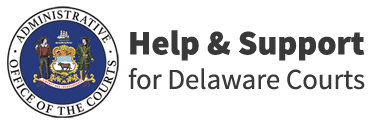Jury Trial in the Court of Common Pleas
What happens at a jury trial?
Because the State of Delaware has the burden of proof, it goes first. The chief law enforcement officer of the State is the Attorney General, and that office prosecutes all criminal and motor vehicle proceedings. The Attorney General, appoints lawyers to represent the Department of Justice in prosecuting these cases, and these lawyers are known as Deputy Attorneys General. All prosecutions are brought on behalf of the State, and the individual charged with motor vehicle offense(s) or criminal charge(s) is the defendant.
In a jury trial, the Judge decides questions of law, and the jury decides questions of fact (whether the defendant is guilty or not guilty on each of the offenses charged.) The trial begins with jury selection. A potential pool of jurors is summoned to court on the morning of trial. The Court of Common Pleas selects jurors from a pool of jurors summoned by the Superior Court.
The potential jurors are asked a series of questions, known as "voir dire." The Court will inform the potential jurors about the case and will identify the names of the lawyers and witnesses to be called in the matter. The jury pool will then be questioned to determine if any potential juror has any personal interest in the case, or whether a reason exists as to why a juror may not be able to render a fair and impartial verdict.
Further information on jury service and/or selection.
Stages of a Jury Trial
Opening Statements
The Deputy Attorney General, on behalf of the State, may make an opening statement to the jury explaining the nature of the case and summarizing the evidence it is going to present. The defendant may likewise make an opening statement summarizing the evidence it plans to present. The defendant may wait to make its opening statement until after the prosecution has completed presenting its evidence.
Presenting Witnesses
The State begins presenting evidence by calling witnesses. Each witness is sworn to tell the truth and testifies from the witness stand. The Deputy Attorney General begins by asking questions (direct examination,) and the defendant may then ask questions of the witness (cross-examination.) The State may ask further questions of the same witness after cross-examination to clarify matters (redirect examination.) The defendant may also ask questions to clarify matters (recross-examination.) The Judge may also ask questions of the witness.
After the last witness for the State has testified, the Deputy Attorney General will inform the Court that the prosecution, or the State, has rested its case- in-chief. After the State rests, the defendant is entitled to present evidence, but is not required to do so.
If the defendant chooses to present evidence, the defendant may then make its opening statement if it did not do so after the prosecution's opening statement. The defendant may begin calling witnesses. As with the State witnesses, each witness is sworn to tell the truth and takes a seat in the witness stand. The defendant asks questions of the witness (direct examination.) The State may then ask questions of the witness (cross-examination,) followed by redirect and recross-examination.
The defendant is entitled to testify as a witness if he/she chooses to do so. Since the defendant has a right to remain silent, the defendant cannot be forced to testify. If the defendant chooses to testify, then the defendant has waived the right to remain silent, and the prosecution may cross-examine the defendant.
After the defendant has presented all of his/her witnesses, the defendant rests. The State may then call rebuttal witnesses. Rebuttal witnesses are witnesses called to oppose or refute evidence presented by defense witnesses. Rebuttal witnesses are questioned in the same manner as other State witnesses.
Closing Arguments
After all witnesses for the State and the defendant have testified, the prosecution again rests its case. The jury will then hear closing arguments. The State begins its closing argument by reviewing the evidence and describing how the evidence proves its case. The defendant may then present its closing argument by reviewing the evidence and describing how it fails to prove the prosecution's case. After the defendant makes his/her closing argument, the prosecution may make a final closing argument.
Jury Instructions
The Judge prepares jury instructions and will "charge the jury" after closing arguments have been heard. The instructions explain the issues in dispute in the case and the positions of the parties. The Judge will also explain the rules of law pertaining to the case, and inform the jurors that they are the sole judges of the facts of the case.
After the Judge has given the jury instructions, the jury recesses to deliberate the case and render a verdict in the matter.
Verdict of the Jury
After the Judge's instructions, the jury decides if the defendant is guilty or not guilty of the charge(s). The verdict must be determined after careful consideration of all the evidence presented at the trial, and must be unanimous.
When all the jurors have agreed on a verdict, the foreperson, or the individual who presides over the jury during deliberations, announces in court the jury's verdict.
Jury Information
The Court of Common Pleas uses the Superior Court jury pool for all of their jury trials. More information about being called for jury duty.
How long will the trial take?
All participants appearing for a jury trial should plan to be at the Court for the entire day.

